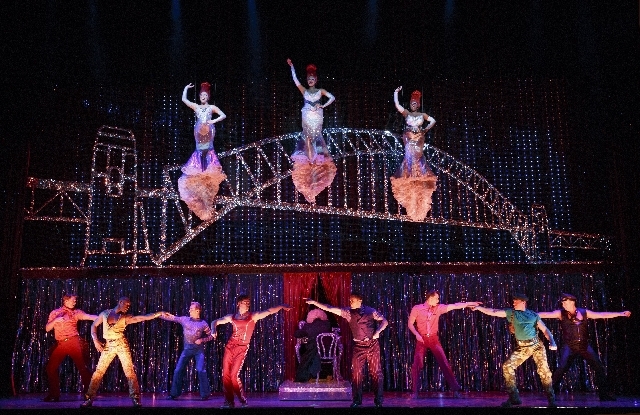Much heart beneath glitter of ‘Priscilla Queen of the Desert’ drag musical, stars say
Dancing cupcakes and paintbrush showgirls (with the head pieces resembling splashes of paint) are the likely reasons why “Priscilla Queen of the Desert” ended up on the Strip for the summer.
But peek under the skirt of the drag musical and what do you find?
“There is a heart that’s underneath it all,” says Scott Willis, one of the three stars of the Broadway show opening Tuesday at The Venetian.
“I love that it is there, hidden beneath all the sequins and glitter,” agrees co-star Wade McCollum.
“Priscilla” is adapted from the 1994 Australian movie, “The Adventures of Priscilla Queen of the Desert,” a road comedy about three drag performers (technically, one is a post-op transsexual) who set out through the Australian outback in the titular bus to perform at a remote casino, a mission motivated by the main character’s desire to meet his young son.
The musical was a big hit in Australia and European markets, but a middling play on Broadway; it lasted 526 performances after opening in 2011. The presumed appeal in Las Vegas producer Base entertainment landing the touring version for nine weeks is twofold:
A) The Tony-winning costumes by Tim Chappel and Lizzy Gardner. There are more than 500 of them, and “Jubilee!” has nothing on them. “They are the most extraordinary events of engineering I’ve ever had the pleasure of wearing,” says McCollum, who plays the nervous father Tick.
B) The “jukebox” approach, now synonymous with “Mamma Mia!,” of pop classics replacing an original score. The songs range from Dionne Warwick to Madonna and The Village People, and some, such as “I Say A Little Prayer,” get a laugh with just their intro lines: “The moment I wake up, put on my hair and makeup ... ”
(The movie characters were hooked on Abba, but that group has its own musical. So Abba may be the only iconic gay tuneage not heard in the show.)
Safe to say the musical was designed to be, as they call it, a romp. While the movie unfolded in dusty, windswept reality, the musical’s production numbers here explode from “this fantastical, hallucinatory, magical inside view of what they’re seeing in their heads,” McCollum explains.
When the characters lip-sync through their drag routines, a trio of drag “angels” descend from the rafters to supply the live vocals. When small-town homophobes paint anti-gay graffiti on their bus, our heroines paint the rest of it to blend, thus conjuring the dancing paint brushes.
But a funny thing happened on the road from Australia to Broadway to, well, the road. This version of “Priscilla” ended up less like “Hairspray” and a little more like the “Priscilla” movie.
“Our show’s usually reviewed as a piece of fluff, but then they’ll go into this three-paragraph explanation of very detailed character analysis,” Willis says with a laugh.
The tour moves into The Venetian from a run at Pantages Theater in Hollywood, where on a recent night the audience included both drag queens and retirement-age couples attending as part of a subscription series.
Both factions seemed to leave satisfied.
“There are a couple of moments in the show where I feel like I could get bigger laughs,” Willis says. “But I told my stage manager a few weeks ago, I really don’t mind if I miss a few laughs as long as people feel something when they leave at night.
“I really believe the Brits love camp and they don’t need that thing I think Americans need,” he adds. “I think Americans really do like a little something underneath.”
And Willis gets many of those touching moments as the transsexual Bernadette, the oldest of the trio and the character who drew the most attention for the movie when played by tough guy Terence Stamp.
After the death of a younger partner, Bernadette is wearing her loneliness on her sleeve when she becomes the default mother figure to the trio’s youngest member, wild boy Adam (Bryan West), and the object of a tentative, unlikely flirtation from a straight bus mechanic (Joe Hart).
McCollum says he is impressed at how the movie’s screenwriter, Stephan Elliott, helped adapt the work, “mining the humanity out of what is a pretty broad musical-comedy piece.”
It was a lot of work, but “lovely work that I adored doing,” he says, “getting as much heart and humanity as we can out of these few lines that connect the big show numbers, and these little scenes that we get to establish a 20-year friendship.”
Both actors say the musical seems to touch a chord and transcend the novelty of its cross-dressing.
“Almost everybody can relate to some kind of prejudice. Almost everybody is in some type of minority,” Willis says. “The whole story really is about these three friends who just kind of want to be who they are, and for the most part are accepted.”
While the program notes don’t establish a date for the action, McCollum says it unfolds in the mid-’90s and is delighted that concerns expressed about gay fatherdom already seem out of date.
“There are archaic anxieties these characters are experiencing, but I think older gay people can understand if they went through it, especially gay parents,” he says. “The social anxiety those people had to go through is more what the play is portraying.”
As a first-time drag performer, Willis says he also has a new respect for the art form — and for well-dressed women in general.
“I have a new appreciation for my mom,” he says. “I know why we were late for church every Sunday. She was the last one to get in the car, but she always looked great.”
Contact reporter Mike Weatherford at
mweatherford@reviewjournal.com or 702-383-0288.
Preview
"Priscilla Queen of the Desert"
8 p.m. Tuesday-Thursday
The Venetian, 3355 Las Vegas Blvd. South
$74.40-$173.40 (702-414-9000)















